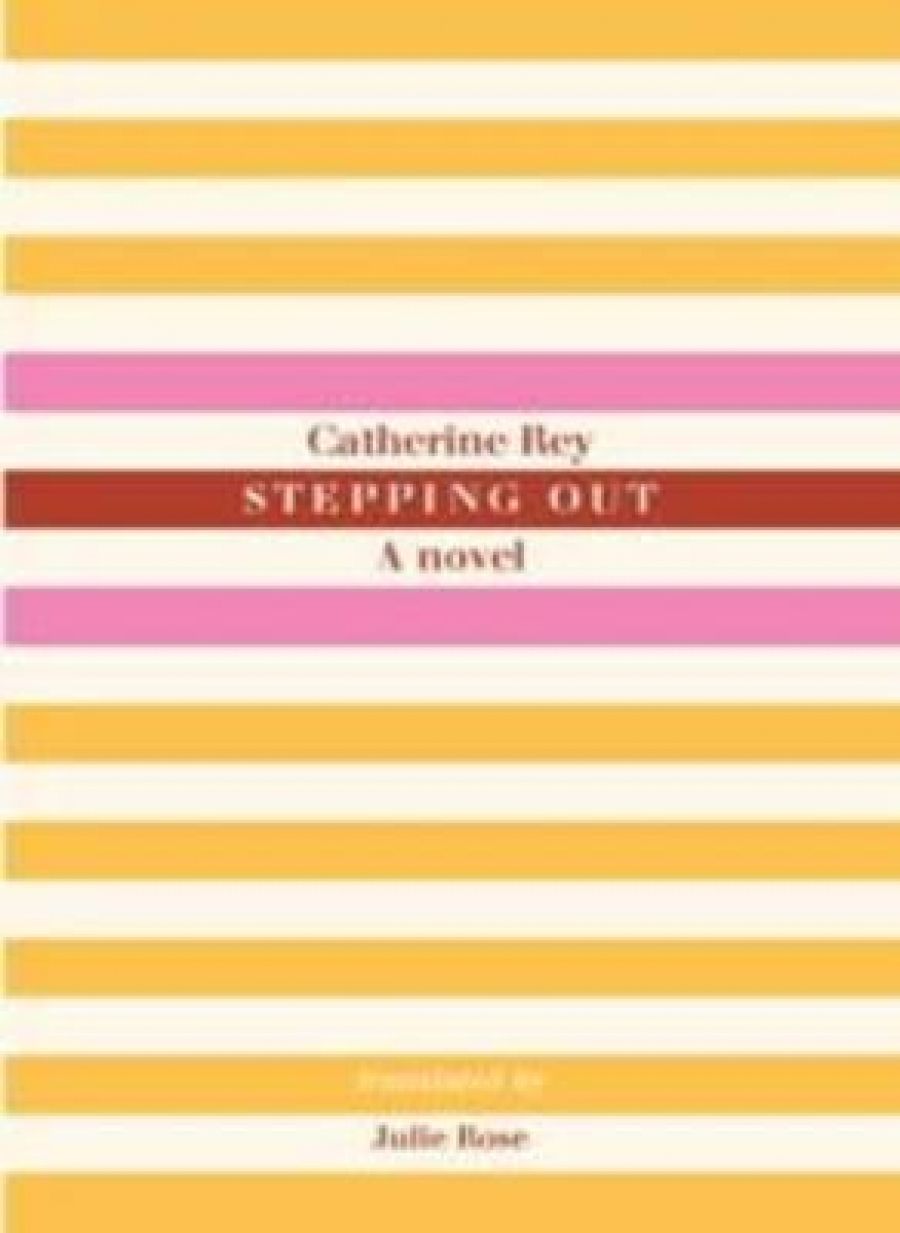
- Free Article: No
- Contents Category: Fiction
- Review Article: Yes
- Online Only: No
- Custom Highlight Text:
Faced with the publication of her first novel, the narrator of Stepping Out has a terrifying thought. ‘I was about to be unmasked,’ she realises. ‘End of my double life. Everyone was about to dip into my world and find out what was really cooking there ... I felt like I’d placed a bomb and was waiting, under cover, for it to explode.’
- Book 1 Title: Stepping Out
- Book 1 Subtitle: A novel
- Book 1 Biblio: Giramondo, $27.99 pb, 216 pp
The publisher’s blurb presents Stepping Out as ‘a portrait of the artist as a young woman’, and the narrator herself cites James Joyce as an influence. Portrait of the Artist as a Young Man (1914–15) ends with Stephen Dedalus resolving to leave Ireland in search of ‘the reality of experience’. Rey’s heroine likewise leaves home in pursuit of ‘life and life’s hard knocks’, and her story unfolds as one kind of exile after another. The first is painful: when she is three weeks old, her mother hands her over to her grandparents. The next is exhilarating. When we meet her, she is a plucky seventeen-year-old, piling her belongings into a taxi. Later, there are harder departures: banishments and flights for her life, hops from the frying pan into the fire.
It is a bumpy journey, as she acknowledges: ‘Why take so many risks, you ask? Why dance so close to the edge of the abyss?’ Exile, she believes, lets her see with a special clarity: ‘I’d jumped the rails ... I’d abandoned the Old World, where the answers fit the questions a bit too snugly.’ Alone in a strange country, she finds, ‘you can finally look at the world in a light so bright you realise that, sadly, you have up till then been content just to tap away at the surface of reality’. On a visit home she feels disconnected, like a soldier returning from battle to a house ‘where everything takes him back to what he no longer is’.
If leaving home is a risky business, being an independent woman can be trickier still. Rey writes tenderly about young women and their choices. Stepping Out is at once a ‘letter to my dead mother’ and a testament for future generations. The teenage Catherine leaves home and school to live with her married, working-class lover. As her grandmother observes at the time, and as Catherine comes to understand much later, what feels like an act of rebellion in fact leads her straight into a most conventional domestic arrangement. ‘The roles have been cast in advance,’ she reflects in middle age, ‘... donkey’s years ago ... I invented nothing ... it was just the same old boring scenario catching up with me.’
There are echoes here of Joyce again, and Stephen’s vow: ‘I do not fear to be alone ... And I am not afraid to make a mistake, even a great mistake, a lifelong mistake.’ To be free, Rey argues, women must be similarly fearless. ‘Why are women ready to endure the worst to avoid growing old alone?’ she laments. ‘Why are we so weak in the face of love? Why was I so weak in the face of love?’ But with freedom comes the risk that we will make mistakes, and the older Catherine is not too hard on her younger self. ‘I feel very close to that young woman,’ she reflects. ‘When you’re young ... you don’t know fear exists ... fear is for old people, like cancer.’
Rey has published five other novels, only one of which (The Spruiker’s Tale, 2005) has appeared in English. Stepping Out has rewards of its own, but I couldn’t help but wonder if I might be missing something: would a portrait of the author as a young woman mean more to a reader with access to all Rey’s work? Certainly, Stepping Out offers insights into The Spruiker’s Tale: we see the painful circumstances in which it was written, and meet the inspiration for Magnolita Rosaria, The Spruiker’s Tale’s magnificently vindictive matriarch. No doubt the references to Rey’s other novels contain similar revelations. But I can’t say I appreciate The Spruiker’s Tale more deeply for having glimpsed backstage like this. If anything, I’m relieved to have read The Spruiker’s Tale first, and so to have had the chance to enjoy it in its own right, not merely as a reflection of the author’s biography.
Rey’s narrator sniffs at conventional memoir: ‘How tranquil a life is when it’s mapped out in some autobiography ... the pretty layout of selective memory leaves little room for the sound and the fury ... novels are closer to the truth.’ There is plenty of sound and fury and not much tranquillity in this helter-skelter story, but it doesn’t entirely abandon the constraints of memoir, and it doesn’t quite achieve the flights of style that made The Spruiker’s Tale so breathtaking.
Stepping Out confirms Catherine Rey as an intriguingly original writer. As a student, the young Catherine dismisses scholarly attempts to explain ‘why writers write’. ‘Rimbaud did not write for the same reasons as Proust,’ she insists. ‘That’s like comparing German measles and scarlet fever.’ Explaining her own motives, however, the mature Catherine is unequivocal: ‘I write because they haven’t yet cut out my tongue. I write because I’m still not frightened.’ Stepping Out is a fearlessly frank book. I hope we will get the chance to explore more of Rey’s backlist in future.


Comments powered by CComment